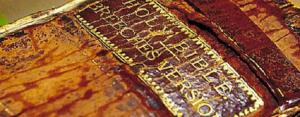Gaelic and Hebrew

History of the Scots Gaels (Israelites)
Listen and learn, Anglo-Saxons and European Israelites!
“In Isaac shall they seed (descendants) be called.” Gen. 21:12.
The Origin of the Saxons
|
Many simply cannot believe the plain records of the ancient peoples who came to the British Isles! They just can’t seem to believe that these peoples could really have been descendants of Shem. We shall notice the same tendency for critics of early Scotch-Irish history. They think the early history (which they call folklore) of these peoples cannot be true when it connects such peoples directly with the lands and peoples mentioned in the Bible. However, Alfred the Great, who was himself a Saxon (son of Isaac) traced his genealogy right back to “Sem” (or Shem) and on back to Adam. |
by Raymond F. McNair
In our dogged search for the Lost Ten Tribes of Israel, we come into contact with another ancient, but important, people of Northwest Europe.
What is the name of that famous people?
There is another name mentioned on the Behistun Rock Inscriptions — the name Saka (in the Persian language), or according to Professor Rawlinson, Sacae, (in the Susian language Sakka). Is this name “Saka” connected with the people of Israel? It certainly is!
We are informed by the Bible that the descendants of Israel were known as Israelites. The suffix “ite” means “son of.” The descendants of the twelve sons of Jacob were likewise called after the names of the twelve patriarchal Fathers. The sons of Levi were called Levites, the descendants of Benjamin were called Benjamites and the children of Dan were called Danites, and so on.
The Sons of Isaac
Were the descendants of Isaac never called after his name? “And God said unto Abraham. Let it not be grievous in thy sight because of the lad [Ishmael — Abraham’s first-born son], and because of thy bondwoman; in all that Sarah has said unto thee, hearken unto her voice; because in ISAAC shall thy seed be called” (Genesis 21:12).
Notice also that this same statement is repeated twice in the New Testament. See Romans 9:7 and Hebrews 11:18. Why did YEHOVAH God solemnly declare in three different places in the Bible that Abraham’s seed would be called after the name of Isaac if he did not mean exactly what He said? Where (and how) in history were the progeny of Abraham and Isaac ever called after the name of ISAAC?
The names “Saxon,” “Saksun,” “Sakaisuna,” and “sons of Sacae” all definitely refer to the “sons of Isaac.”
The “I” Has Been Dropped
It is quite common in some languages to drop the initial syllable from a word. Dr. Schrader points out that “the Assyrians dropped the ‘i’ when they spoke of an lsraelite.” Also, it was quite common to sometimes add a new final syllable to a name. “Ahab is called by Shalmanassar II A-HA-AB-BU SIR-‘-LAI, i.e. “Ahab of Israel” in an inscription discovered on the banks of the Tigris.
This is undoubtedly what has happened in regard to the Isaac-sons (Saxons). The “i” has been dropped and the basic part of the word “sak” or “sac” has been retained. “Son” simply means son of. So the word “Saxons” means “sons of (I)SAC” or “sons of Isaac. Later, we shall see quotations from reliable historical sources proving that “Saxon” derives from “sons of Sac” or “sons of Sak” (meaning “sons of Isaac”).
In the days of the Judges, the Ephraimites could not sound the “h” in the word “Shibboleth.”
During a struggle between Israelitish factions, the inability of the Ephraimites to pronounce the “h” cost many of them their lives. Speaking of fugitive Ephraimites we read: “Then said they unto him, Say now Shibboleth: and he said Sibboleth: for he could not frame to pronounce it right. Then they took him, and slew him at the passages of Jordan: and there fell at that time of the Ephraimites forty and two thousand” (Judges 12:6).
Many Hebrew-speaking Jews have difficulty pronouncing their “h’s” to this day. Why do we all say “Semitic” instead of ”Shemitic”? Is it not because the “h” has been dropped in this word?
It is quite common among many of the people of the British Isles even today, to drop an initial letter in some words. This is especially true of the letter “h”, which is often dropped by many English-speaking people who live in Great Britain.
“Where did I ‘ang me ‘at?”, a Welsh friend of mine once asked. And a British plumber told me one day, that it was “air” which had stopped up my drain. He had to repeat himself several times before I realized that he meant “hair” instead of “air.”
The Anglo-Saxons Descendants of Shem
Before we pursue further the derivation of the word “Sacae,” we will consider historical evidence proving that the Anglo-Saxon peoples have descended from Shem.
We have already noted that Lysons made this confession:
“I confess that but for the universal tradition which assigns our [the British] descent to Japhet, I should have been rather inclined to attribute to the British Celts a Semitic origin, both on account of the relics of worship which we find in Britain, and also on account of the language…” (Our British Ancestors, p. 18).
Lysons then shows that there are literally thousands of words in the English language which come from the Hebrew language (ibid., p. 21 ff.).
He says:
“Thus I proposed to show in the course of these pages when we come to the relics of British worship remaining in the country, and remaining with little variation or corruption their aboriginal names, the remarkable similarity between those names and the HEBREW and CHALDEE languages” (ibid., p. 21).
He then points out that many of the “old British families” have Hebrew names. “Now, whatever may be the historical value of the Welsh poems, it is undoubted that Talies in his Angar Cyfyndawd, says that his lore had been ‘Declared in Hebrew, Hebraig….'” (ibid., p. 22).
On page 93 of this same work, Lysons says:
“Yet this we gather from the names attaching to the British monuments still remaining among us, when divested of modern corruptions, that there is a strong affinity between these British names and that language of which Hebrew is either the original or one of its earliest offshoots; and that therefore HEBREW, CHALDEE or some other very near cognate, must have been the language of the first inhabitants in this island” (ibid., p. 93).
Lysons then proceeds to show the similarity between many ancient British and Hebrew words, and between the corrupted religion of the Palestinian Israelites and that of the ancient British people. Lysons finally makes this startling statement:
“We cannot avoid the conclusion that our British ancestors were devoted to that kind of worship which they brought with them from the East, whence they came at a very early period, even close upon the Patriarchal times of Holy Writ” (ibid., pp. 93, 94).
It has already been clearly pointed out that the early British ancestors said they came from Armenia in the area of the Caucasus Mountains; and we know that many of them arrived in the British Isles centuries before the Messiah’s birth.
Welsh and Hebrew
Robert Owen also substantiates this view by the following statement:
“Most Welsh scholars have employed their time on the production of grammars and dictionaries. The Hebrew learning of Dr. John Davies of Mallwyd seems to have influenced his countrymen to accent the Puritan atavism of referring Welsh to the language of Moses as its fountain” (The Kymry, pref. v., vi.).
For any who still might have any lingering doubts regarding the similarity between the Hebrew and the early British languages which were used by its ancient peoples, one need only study the present-day Welsh language. There are many strong similarities between modern Welsh and Hebrew. Even one who is unskilled in the science of languages cannot fail to detect a close similarity between the spoken Hebrew language when contrasted with modern Welsh. Many Welsh words are almost devoid of any vowels whatsoever, just as the ancient Hebrew language was written without any vowels.
A number of books have been written besides the ones mentioned here which show the close affinity between the languages as spoken by some of the early British peoples and the Hebrew language.
As an example of some modern Welsh names with few written vowels. here is part of the address of a friend of mine. The name is fictitious, however. Nathan Evans, Tyddyn Valley, Llanddoget, Llanrwst, Denbighshire. Notice that the anglicized words have far more vowels written in them than do such words as “Llanrwst.”
We have already observed that it has been commonly taught that the British have descended from Japheth. Nothing could be farther from the truth!
Here is proof that the British have descended from Shem, and are therefore Semitic (Shemitic):
“Alfred, king of the Anglo-Saxons, was born in the year of our Lord’s incarnation eight hundred and forty-nine…King Alfred was the son of Geata…The Geata was the son of…Heremod…the son of Sem” (Church Historians of England, Annals of Exploits of Alfred the Great, vol. 11, pp. 443-44).
We have noticed that Alfred the Great, king of the Anglo-Saxons was a descendant of “Sem.” This same quotation continues as follows: “Heremod…the son of Sem, the son of Noe, the son of Lamech, the son of Methusalem, the son of Enoch, the son of Malaleel, the son of Cainan, the son of Enos, the son of Seth, the son of Adam” (ibid.).
Alfred the Great, who was himself a Saxon (son of Isaac) traced his genealogy right back to “Sem” (or Shem) and on back to Adam.
“So the Anglo-Saxons may well have had records of the ancestry of their kings, beginning with Sceaf…and calling Sceaf the son of Noe, born in the ark, or even identifying him with the patriarch Shem” (Haigh, The Conquest of Britain by the Saxons, Chapter III, p. 115).
Haigh makes the grave mistake that many others do. Many simply cannot believe the plain records of the ancient peoples who came to the British Isles! They just can’t possibly believe that these peoples could really have been descendants of Shem. We shall notice the same tendency for critics of early Scotch-Irish history. They think the early history (which they call folklore) of these peoples cannot be true when it connects such peoples directly with the lands and peoples mentioned in the Bible.
We shall see in a another article that the Scythians, who were the ancestors of the Anglo-Saxon, spoke a language that had a strong similarity with Hebrew. Should this fact amaze us? it should not cause any alarm, especially when one sees that these Scythian peoples came from the region of the Caucasus Mountains not long after they were taken as captives to that general area by the Assyrian kings in 733-732 and 721 B.C.
Time does not permit us to give the innumerable similarities between the early British words and the Hebrew: but consider the words “British” (Heb. “covenant man”), and “Britain” (Heb. “covenant land”). All of the early British languages had many points in common with the Hebrew language.
Who Were The Sacae?
The Bible had prophesied, as we have already observed, “In ISAAC shall thy seed be called” (Genesis 21:12).
Have you ever known of any people being called after Isaac?
It might be well to point out here that the Persians spoke of all the people of Scythia as the Sacae or Sakka, because the Sacae were a branch of the Scythian people who dwelt nearest to them. Modern research confirms conclusively that the Sacae were a very important branch of the people who were called by the name of Scythians.
Before quoting from Sharon Turner, one of the most eminent authorities on the Anglo-Saxons, let us take a biographical glance at this well-known historian:
“TURNER, SHARON (1768-1847), English historian, was born in Pentonville, London, on the 24th of September 1768….He was educated at a private school kept by Dr. Davis in Pentonville, and was articled to a solicitor in the Temple in 1783.
“In early boyhood he had been attracted by a translation of the ‘Death Song of Ragnar Lodbrok,’ and was led by this boyish interest to make a study of early English history in Anglo-Saxon and Icelandic sources. He devoted all the time he could spare from his business to the study of AngloSaxon documents in the British Museum. The material was abundant and had hitherto been neglected. When the first volume of his History of England from the Earliest Times to the Norman Conquest appeared in 1799, it was at once recognized as a work of equal novelty and value. The fourth volume appeared in 1805….” (Ency. Brit., 11th ed., art. Turner, Sharon).
According to the French dictionary by Larousse, Sharon Turner was an “attorney by profession, (who) spent his leisure time doing research relating to Anglo-Saxon and Irish scripts” (Larousse,art. “Sharon Turner”).
A very reliable historical account of the Anglo-Saxons, by Sharon Turner, gives a number of salient points regarding the Anglo-Saxons. It is so important that it is here given verbatim:
“The Saxons were a…Scythian tribe; and of the various Scythian nations which have been recorded, the Sakai, or Sacae, are the people from whom the descent of the Saxons may be inferred with the least violation of probability. Sakai-suna or the sons of Sakai, abbreviated into Saksun, which is the same sound as Saxon, seems a reasonable etymology of the word Saxon. The Sakai, who in Latin are called Sacae, were an important branch of the Scythian nation. They were so celebrated, that the Persians called all the Scythians by the name of Sacae; and Pliny, who mentions this, speaks of them as among the most distinguished people of Scythia (Pliny, lib. vi. c. 19). Strabo places them eastward of the Caspian…” (The History of The AngloSaxons, vol. I, p. 87).
Note that Turner shows the Sacae were an important branch of the Scythian nation. They lived to the east of the Caspian Sea. According to Turner, these Scyths (Sacae) seized the most fertile part of Armenia! Also observe that this was the same general area (Armenia) to which Israel had been deported:
“This important fact of a part of ARMENIA having been named Sakasina, is mentioned by Strabo in another place (Strabo, p. 124), and seems to give a geographical locality to our primeval ancestors, and to account for the Persian words that occur in the Saxon language; as they must have come into Armenia from the northern regions of Persia” (ibid., p. 87).
Turner says that “our primeval [Saxon] ancestors” went into Armenia from northern Persia. This again was the precise area of Israel’s dispersion.
The following quote from Turner is so significant that it must be given in toto:
“That some of the divisions of this people were really called SAKASUNA, is obvious from Pliny; for he says that the SAKAI, who settled in Armenia, were named SACASSANI (Pliny, lib. vi. c. 11); which is but SAKA-SUNA spelt by a person unacquainted with the meaning of the combined words. And the name SACASENA (Strabo. lib. xi. pp. 776, 778), which they gave to the part of Armenia they occupied, is nearly the same sound as SAXONIA. It is also important to remark, that Ptolemy mentions a Scythian people sprung from the Sakai, by the name of SAXONES. If the Sakai who reached Armenia (“from the northern regions of Persia”) were called Saca-sani, they may have traversed Europe with the same appellation; which being pronounced by the Romans from them, and then reduced to writing from their pronunciation, may have been spelt with the x instead of the ks, and thus SAXONS would not be a greater variation from SACASSANI or SAKSUNA than we find between French, Francois, Franci, and their Greek name, Phraggi; or between Spain, Espagne, Hispania” (ibid., p. 88).
Turner is undoubtedly correct in saying that the “ks” was changed to an “x.” These variations of the word Sacae (or Saka) are not any greater, says Turner, than the variations of names for such modern nations as France and Spain (ibid., pp. 87, 88, 95).
Origin of the Saxons
He then says that Ptolemy placed another people, the Sasones, north of the Sacae. “These have been selected as our ancestors…Sasones, Sacaesons, Saxones” (ibid., fn., p. 95).
Turner then mentions that some of these marauding Sakai or Saca-sana were, in all probability, gradually propelled to the west coast of Europe, on which they were found by Ptolemy, and from which they made incursions into the Roman Empire, in the third century A.D. A people known as the Saxoi, lived on the Black Sea, according to Stephanus (Stephanus de urb. et Pop. p. 657).
“We may,” says Turner, “consider these, also, as a nation of the same parentage.” These Sakai wandered far and wide from Asia to the German Ocean. He also points out the traditional descent of Odin as preserved by Snorre in the Edda and his history which represents the Saxon and Scandinavian chieftains as having migrated from a city, east of the Tanais, called Asgard, located in a country called Asaland, meaning the city and the land of the Asae or Asians (Snorre Ynlinga Saga, c. 2. and 5).
Thus, we see that Turner equated the Sacae with Odin and his people, the Asae, from Asgard, north of the Black Sea — the very area where we find many of the Israelites located shortly after their exile (ibid., pp. 88, 89).
“But that of the most learned German seems most probable and worthy to be embraced, which makes the Saxons descend from the Sacae, the most considerable people of Asia, and to be so called quasi Sacasones, q.d. sons of the Sacae, and to have gradually overspread Europe from Scythia or Sarmatia Asiatica, with the Getae, Suevi, Daci and others. Nor is their opinion ill-founded, which brings the Saxons out of Asia, in which the human race had both its rise and increase…” (Camden, Britannia, vol. I, p. 151).
Camden seems to completely agree with Turner in identifying such peoples as: Saxons, Sacae, Sacasones, (“sons of the Sacae”), Saci, q.d. Sassones, Sacasena. Note that they came “from Scythia.” He says that “these people kept almost as near to one another in Europe” as they had before in Asia.
“The Sacae, who are Scythians, had on their heads caps, which came to a point and stood erect: they wore loose trousers, and carried bows peculiar to their country….These, though they are Amyrgian Scythians, they call Sacae, for the Persians call all the Scythians Sacae” (Herod. Polymnia, bo. VII, par. 64).
From Herodotus’ statements, we can see that the Sacae were actually a Scythian tribe. Herodotus called them “Amyrgian Scythians.”
According, to the Encyclopedia Britannica, the Angli or Angles were merely a branch of the Saxons. The Anglo-Saxons invaded England in the 4th, 5th and 6th centuries A.D. (Ency. Brit. 11th ed., vol. XXIV, art. “Saxons,” pp. 264. 265).
We shall later have occasion to refer to the Sacae or Saxons as we study the Scythian and other tribes in future articles.
Here is a final quotation which clearly shows that “Saxon” is derived from “sons of Sacae.” Milton says that the Saxons were a heathen and a barbarous nation, famous for their robberies and cruelties done to all their neighbours, both by land and sea:
“They [the Saxons] were a people thought by good writers to be descendants of the Sacae, a kind of Scythians in the north of Asia, thence called Sacasons, or sons of Sacae, who with a flood of other northern nations came into Europe, toward the declining of the Roman Empire” (History of England, 1835 ed., bk. III, pp. 406, 407).
Notice how many different historians equate the Scythians with the Sacae; and also note how many show that the “Sacasons” (or Saxons) were “sons of Sacae” ( (I)saac)!
The Saxons are descendants of Isaac. “In Isaac shall thy seed be called” (Genesis 21:12). It is primarily through the Saxons that this prophecy has been (and is still being) fulfilled!





